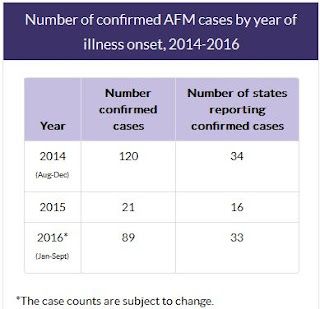#11,866
As I mentioned yesterday in Taiwan CDC: Enterovirus Infections On The Increase, America's CDC has been investigating an - as yet - unexplained increase in AFM (Acute Flaccid Myelitis) cases across the nation in 2016.
Acute flaccid myelitis (AFM) is a rare illness that affects a person’s nervous system, specifically the spinal cord. AFM may be due to a variety of causes, including viral infection.
The (updated Nov 1st) chart at the top of this blog shows that so far this year, the CDC has identified 89 cases of AFM from 33 states, a more than 400% increase over 2015, and an 80% (n=39) jump over the previous month's total.
The elevated AFM cases which begin in August of 2014 have been tentatively linked to EV-D68, a relatively rare non-polio enterovirus that caused a nationwide outbreak of mild to moderate respiratory illness two years ago, mostly among children and teenagers.
While a pretty good circumstantial case has been made over the past couple of years (see EID Journal Enterovirus D68 Infection in Children with Acute Flaccid Myelitis, Colorado, USA, 2014), no definitive causal link to EV-D68 has been established.
That said, there are many other viruses - including EV-71, West Nile Virus, cytomegalovirus and Epstein-Barr virus, and adenoviruses - that can cause similar neurological symptom.
Although some sporadic cases of EV-D68 infection have been reported this year, the CDC states:
There is no indication of unusual activity. Enteroviruses are ever-present in the community, and each year we expect to detect cases.
All of which leaves us with a mystery as to what is causing this rise in AFM, predominantly among children across the nation.
The CDC's AFM page states:
At a Glance
- CDC is concerned about AFM, a serious illness that we do not know the cause of or how to prevent it.
- CDC is investigating the increase in AFM in 2016. As of September 2016, 89 people in 33 states were confirmed to have AFM.
- Even with an increase in cases in 2016, AFM remains a very rare disease (less than one in a million).
- While the AFM case count for 2016 is less than the 2014 case count, CDC is concerned about the increase in cases in recent months.
- CDC is intensifying efforts to understand the cause and risk factors of AFM.
- It's always important to practice disease prevention steps, like washing your hands, staying up-to-date on vaccines, and protecting yourself from mosquito bites.
What We Know
What we know about the AFM cases reported since August 2014:
- Most patients are children.
- The patients’ symptoms have been most similar to those caused by certain viruses, including poliovirus, non-polio enteroviruses, adenoviruses, and West Nile virus. See a list of viruses associated with AFM.
- Enteroviruses can cause neurologic illness, including meningitis. However, more severe disease, such as encephalitis and AFM, is not common. Rather, they most commonly cause mild illness.
- CDC has tested many different specimens from the patients for a wide range of pathogens (germs) that can cause AFM. To date, we have not consistently detected a pathogen (germ) in the patients’ spinal fluid; a pathogen detected in the spinal fluid would be good evidence to indicate the cause of AFM since this illness affects the spinal cord.
- The increase in AFM cases in 2014 coincided with a national outbreak of severe respiratory illness among people caused by enterovirus D68 (EV-D68). Among the people with AFM, CDC did not consistently detect EV-D68 in the specimens collected from them. In 2015 there were no cases of EV-D68 detected and so far in 2016, only limited sporadic cases of EV-D68 have been detected in the United States.
What We Don't Know
What we don’t know about the AFM cases reported since August 2014:
- Despite extensive testing, CDC does not yet know the cause of the AFM cases.
- It is unclear what pathogen (germ) or immune response is causing the disruption of signals sent from the nervous system to the muscles causing weakness in the arms and legs.
- CDC has not yet determined who is at higher risk for developing AFM, or the reasons why they may be at higher risk.
See Prevention for information about how to protect your family from viral infections that may cause AFM.
This is obviously a story we'll continue to follow closely.

